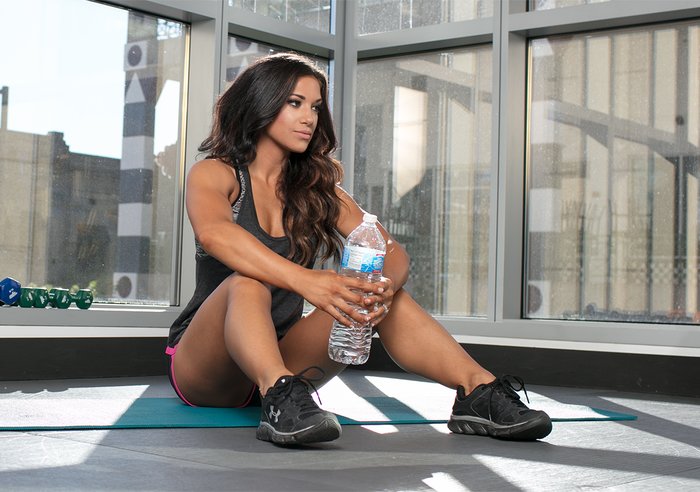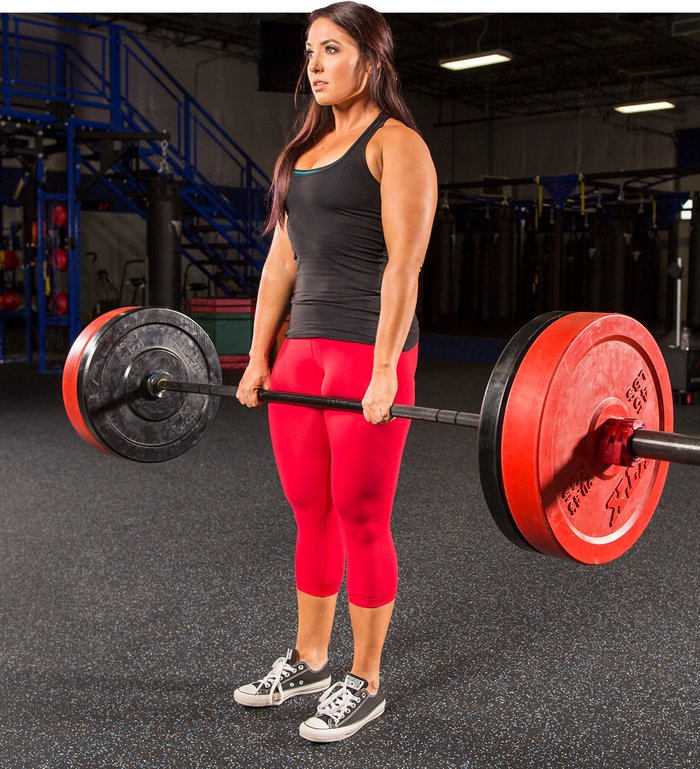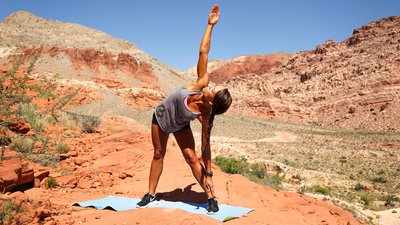Looking to make this coming year your healthiest yet? Whether your goal is to smash PRs, get super shredded, or simply focus on holistic health—lowering blood pressure, boosting good cholesterol, and hitting all of your doctor's appointments out of the park—there are a few tips that you should be following.
No need to be overwhelmed by the deluge of advice out there. No matter your goal, each of these five tips can aid you in achieving success in health and fitness. Whether they're geared toward cutting, bulking, or getting back that post-baby body, they all spell results.
Follow these universal guidelines for creating a healthier you in 2017, and you won't be disappointed.
1. Feast on Fresh, Natural, Whole Foods
Feeling overwhelmed by all the diets out there? You aren't alone. One quick walk through the nutrition section of any bookstore will leave you dizzy with the array of choices. One principle always stands, though: Focus on eating fresh, natural, and whole foods.
By this, I mean foods that are built by Mother Nature and chock-full of nutritional goodness—no added nitrates, sodium, or red dye #3. If you can only commit to one permanent dietary change this year, it should be to dump all processed, manmade foods and opt for wholesome options in their natural state. Trade in neon-orange-dusted Cheetos for calcium-rich string cheese. Let go of that high-sodium frozen TV dinner and instead whip up a hearty (and healthy) version of comfort food such as meatloaf or a new take on Asian flair with a beef, broccoli, and blackberry bowl. No time? No problem. Ditch the oven and whip up wholesome versions of comfort foods—such as mac n' cheese and stuffed pepper—in the microwave.

Keep in mind that for this tip to be effective, prep work is key. Healthy foods must hit your cart before they hit your palate. Before you go to the grocery store, make a list of clean-eating items including lean proteins, complex carbs, and green veggies for the week.
Also, remember to shop the perimeter, to keep your cart closer to the nutrient-dense foods and away from prepackaged, overly-processed junk.
2. Assess Your Hydration
Between the trendy water bottles and office-filled hydration stations, you'd think we'd be well-watered by now but, as it turns out, the majority of people aren't. The average human body is 57-60% water, making it a critical ingredient for life. Yet, instead of giving our body the fresh, pure water it desires, we're quenching our thirst with beverage choices like juice, alcohol, and sugary soda.
Alcohol and sodas don't do much in the way of keeping you hydrated. Research shows that alcohol consumption can not only lead to dehydration, but can also block the absorption of important nutrients such as B-vitamins and adversely affect exercise performance.[1,2] The added empty calories can also lead to weight gain.

If you want to stay optimally hydrated, focus on pure water as often as possible. Not only will you have more energy, you'll also avoid dehydration-related headaches, recover more easily from your workout sessions, and manage your weight better.
So how many glasses of H20 should you aim for daily? The International Sports Sciences Association (ISSA) recommends drinking 8-12 glasses of water per day. The ISSA also recommends drinking 16 ounces of water for every pound of weight lost during exercise.[3]
3. Stop Playing the Comparison Game
Staying healthy is about more than focusing on the leanness of your physique, the numbers on the scale, or the week-after-week comparison of progress photos. Your mental health is as important as a trim waistline. One important way to keep sane on your journey is to stop playing the comparison game. Sure, your favorite fitness model might have a more prominent V-taper, and your Instagram inspiration might always have meals prepped and portioned by Sunday afternoon. But you're not them. In the age of social media, it's easier than ever to compare yourself to others—and lose sight of your own journey in the process.

When you feel you're not muscular enough, lean enough, or as if your transformation doesn't measure up to those you follow, you're left feeling down and depressed about your own efforts. This can lead to discouragement and even giving up.
To make 2017 your year, you need to remember that the only thing you can control is your own results. Each body is unique and different. No one is in your shoes or dealing with your exact situation, so to compare yourself to them is not valid. The only comparison you should be making in the coming year is with your 2016 self. Are you doing better than you were before? If so, you are winning.
4. Prioritize Quality Sleep
Sleep is a heavily talked-about subject, yet most of us are still burning the midnight oil. If there is one thing that will improve your overall health, it's to sleep more and better.
Sleep influences every element of your day-to-day life. Chronic sleep deprivation can influence your risk of heart disease, decrease insulin sensitivity, increase your risk for type-2 diabetes, lower your testosterone concentrations, and delay exercise recovery.[4-6]

Aim for at least seven hours of quality sleep each night, but eight or nine is better—and don't think you can make up for lost sleep by sleeping in on the weekend. Studies suggests that playing catchup won't help. You'll still be at risk for performance-related deficits during the week. [7]
Having trouble falling asleep? If counting sheep isn't working, practice proper sleep hygiene by decreasing your room temperature, blacking out all light, avoiding electronic devices in the few hours before bed, and using white noise to limit disruption.
5. Lift Heavy Weights Regularly
Regardless of whether your goal is to burn fat, build muscle, gain strength, or reduce your risk of disease, it's important to make lifting a part of your program. No other form of exercise offers the benefits of resistance training. Not only will it help keep the weight off and make you stronger, lifting heavy also protects bone health, boosts energy and mood (thank you, endorphins), and can improve coordination and flexibility.

This doesn't mean you have to forgo your usual routine for all heavy lifting; it just means that once or twice per week, you should focus on adding more weight and dialing up the intensity. This will help create a strong metabolic response and may help you maintain strength as you age.[8]
References
- Ferreira, M. P., & Weems, M. S. (2008). Alcohol consumption by aging adults in the United States: health benefits and detriments. Journal of the American Dietetic Association, 108(10), 1668-1676.
- El-Sayed, M. S., Ali, N., & Ali, Z. E. S. (2005). Interaction between alcohol and exercise. Sports Medicine, 35(3), 257-269.
- ISSA - Personal Trainer & Fitness Certifications : ISSA Online.edu. (n.d.). Retrieved from https://www.issaonline.edu/
- Ayas, N. T., White, D. P., Manson, J. E., Stampfer, M. J., Speizer, F. E., Malhotra, A., & Hu, F. B. (2003). A prospective study of sleep duration and coronary heart disease in women. Archives of Internal Medicine, 163(2), 205-209.
- Gonzalez-Ortiz, M., Martinez-Abundis, E., Balcazar-Munoz, B. R., & Pascoe-Gonzalez, S. (2000). Effect of sleep deprivation on insulin sensitivity and cortisol concentration in healthy subjects. Diabetes Nutrition and Metabolism, 13(2), 80-83.
- Luboshitzky, R., Zabari, Z., Shen-Orr, Z., Herer, P., & Lavie, P. (2001). Disruption of the nocturnal testosterone rhythm by sleep fragmentation in normal men. The Journal of Clinical Endocrinology & Metabolism, 86(3), 1134-1139.
- Herscovitch, J., & Broughton, R. (1981). Performance deficits following short-term partial sleep deprivation and subsequent recovery oversleeping. Canadian Journal of Experimental Psychology, 35, 309.
- Tesch, P. A., Colliander, E. B., & Kaiser, P. (1986). Muscle metabolism during intense, heavy-resistance exercise. European Journal of Applied Physiology and Occupational Physiology, 55(4), 362-366.

